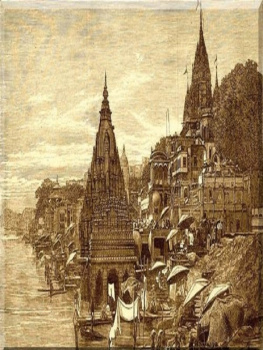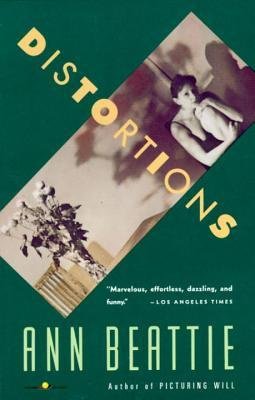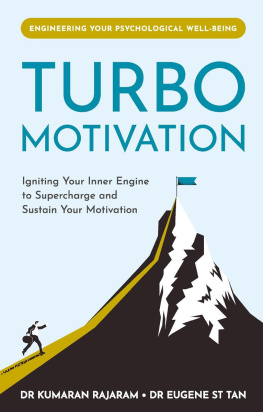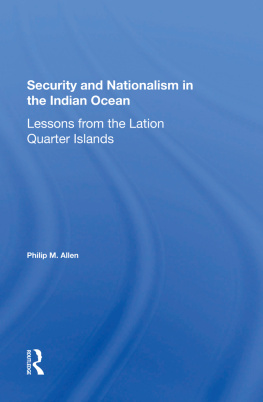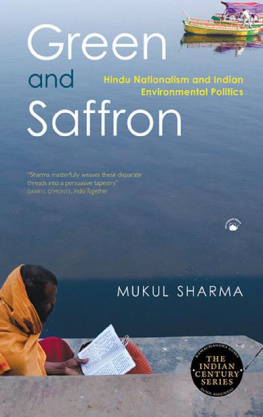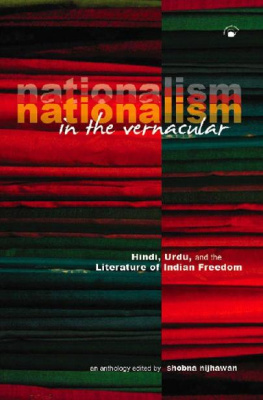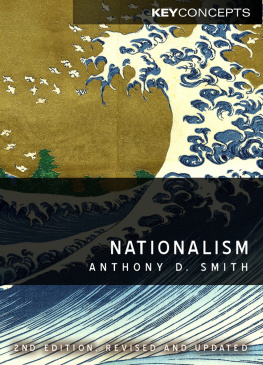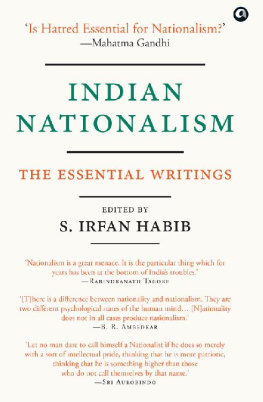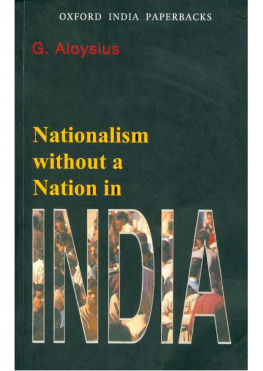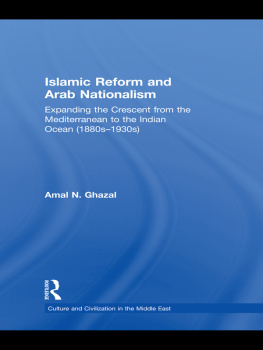N.S. Rajaram - Nationalism And Distortions In Indian History
Here you can read online N.S. Rajaram - Nationalism And Distortions In Indian History full text of the book (entire story) in english for free. Download pdf and epub, get meaning, cover and reviews about this ebook. year: 2005, publisher: Voice of India, genre: History. Description of the work, (preface) as well as reviews are available. Best literature library LitArk.com created for fans of good reading and offers a wide selection of genres:
Romance novel
Science fiction
Adventure
Detective
Science
History
Home and family
Prose
Art
Politics
Computer
Non-fiction
Religion
Business
Children
Humor
Choose a favorite category and find really read worthwhile books. Enjoy immersion in the world of imagination, feel the emotions of the characters or learn something new for yourself, make an fascinating discovery.
- Book:Nationalism And Distortions In Indian History
- Author:
- Publisher:Voice of India
- Genre:
- Year:2005
- Rating:3 / 5
- Favourites:Add to favourites
- Your mark:
- 60
- 1
- 2
- 3
- 4
- 5
Nationalism And Distortions In Indian History: summary, description and annotation
We offer to read an annotation, description, summary or preface (depends on what the author of the book "Nationalism And Distortions In Indian History" wrote himself). If you haven't found the necessary information about the book — write in the comments, we will try to find it.
Nationalism And Distortions In Indian History — read online for free the complete book (whole text) full work
Below is the text of the book, divided by pages. System saving the place of the last page read, allows you to conveniently read the book "Nationalism And Distortions In Indian History" online for free, without having to search again every time where you left off. Put a bookmark, and you can go to the page where you finished reading at any time.
Font size:
Interval:
Bookmark:
Preface
The first half century of Indias existence as a free nation is characterized by two significant failures: first, a failure to define the concept of India as a nation; second, a failure to evolve national institutions in education and intellectual life. In other words, a comprehensive failure to define a vision of nationalism rooted in the countrys history and culture. The result is that anti-national forces have had a field day, seriously undermining national security. Since these fifty years have been dominated by the Congress Party by the Nehru-Gandhi family in particular the party and the dynasty cannot escape responsibility for these momentous failures.
I have written this little book to meet a specific need. There is a great deal of interest among young people about the history of India, which many correctly believe to have been distorted by interests hostile to the nation. I receive repeated requests from organizations all over the country to speak on these topics. It is impossible for me to honor even a small fraction of them. But there is no denying the need for these lectures and seminars. At this time there is a shortage of people who can speak and write on these subjects. I hope this little book will encourage young people to develop their own study groups to meet the need that I cannot personally meet. The final section on additional readings should help in this regard.
To return to the main theme of this book, most nations distort their history to enhance achievements and build their national spirit. But in India, the situation in the first fifty years since independence has been the reverse of this. Indian history has been distorted to favor ideas and groups hostile to national interests. The result is that students are brought up to be apologetic and even ashamed of their history and tradition, despite having one of the greatest heritages in the world, if not the greatest. This is not an accident. During the colonial era, it was natural that the British should have established institutions and an education system that promoted their own interests. But for fifty years after independence, the same values and institutions were perpetuated by successors of the British.
These successors to colonial rulers identify themselves with alien values and their former rulers to such an extent that they are implacably hostile to anything Indian, especially Hindu. Advances in knowledge brought about by archaeology and other sciences did not make them give up discredited versions rooted in the colonial past. The result is a version of history that is not only unworthy of a great nation but also mostly false. This small volume is meant partly as a corrective. I have tried also to identify the causes and suggested some remedies.
My goal in writing this little volume is therefore twofold. First, I want to expose and highlight the magnitude of the failures and distortions and identify their causes. Second, I want young people to go to the sources given in the readings to develop their own independent study groups and conduct seminars. This will go towards building an intellectual infrastructure rooted in Indian history and culture in contrast to copies of defunct colonial values that dominates the intellectual scene today.
N.S. Rajaram April 2000
CULTURE AND NATIONALISM
Struggle for nationhood
It is a great honor for me to be invited to deliver the Second Radha Nath Phukan Memorial Lecture. I am particularly happy to be at the Vivekananda Kendra Institute of Culture, which is one of the premier institutions of its kind with an outstanding record of scholarship and service. I am close to the Vivekananda Kendra, with many friends in the organization. Sri P. Parameswaran is an esteemed friend of mine, as are Dr. Nagaratna, Sri Raghuram and Dr. Nagendra of Bangalore.
For the topic for my lecture today, I have chosen Culture and Nationalism. My interest is mainly ancient history, especially Vedic history. I rarely take public positions on issues of contemporary politics. In fact, some of my friends joke that my interest in the world stops at 2000 BC, when the Vedic river Sarasvati stopped flowing. But here I will break from this practice and say something about Indias Freedom Movement and its relationship to current events. This is because what I see in India today is a struggle between a rising historical awareness of a people belonging to a long suppressed ancient civilization and the residual forces of its colonial past. It is in fact a struggle between Indian nationalism and the agents of past imperialisms.
In this regard, some of the things I have to say in this lecture may come to you as a surprise and even a shock. This is particularly the case with what all of us learnt in school about the Freedom Movement and some of its leaders. One of the points I want to make is that what we have been told was the Freedom Movement happened to be only one spoke of the wheel of history an aspect that has been blown out of proportion to help some vested interests. An accurate history of events and forces leading to Indian independence is yet to be written. Ill get to this point later, but first a few words about the role of history in the preservation of culture and inspiring nationalism.
India is unique among the nations of the world in that it is rooted in a spiritual civilization. There are forces at work today that want to suppress its spirituality and replace it with a crassly materialistic system. This is how I read the political struggle going on in the country today. As I noted earlier, I normally do not take a public position on politics and political parties. But I am making an exception to this because I see the present political turmoil as the outcome of forces of materialism mostly destructive in nature trying to impose an alien materialistic culture camouflaged as secularism. If they succeed, India will share the fate other ancient nations that were destroyed by the imposition of materialistic ideologies. Greece and Egypt are examples from the ancient world. American Indian civilizations destroyed by the Catholic empires of Spain and Portugal are also examples of the same kind. In our own time, China is engaged in destroying the highly spiritual culture of Tibet. All that the destroyers have left in these countries are imitative societies with little to call their own. To be convinced of this, all you have to do is visit an ancient country like Egypt, Greece or Mexico and see the glaring contrast between their wonderful monuments and their current cultural deprivation. This is what a materialistic ideology invariably does to a civilization.
The destruction of any civilization is always done through distorting its history.A version of history is created to turn the victims into villains and the destroyers into heroes. So in defending a civilization, it is extremely important for the leaders to preserve and protect its culture and traditions. Monuments can come and go, but an awareness of history and culture must be preserved. Our ancient sages and medieval heroes largely succeeded in this. That is why our civilization has survived the assault of theocratic and imperialistic forces, while other ancient civilizations failed. As a young French student of the Vedas, Jean Le Me wrote:
"Precious stones or durable materials gold, silver, bronze, marble, onyx or granite have been used by ancient people in an attempt to immortalize themselves. Not so however the ancient Vedic Aryans. They turned to what may seem the most volatile and insubstantial material of all the spoken word...
"The pyramids have been eroded by the desert wind, the marble broken by earthquakes, and the gold stolen by robbers, while the Veda is recited daily by an unbroken chain of generations, traveling like a great wave through the living substance of mind."
Font size:
Interval:
Bookmark:
Similar books «Nationalism And Distortions In Indian History»
Look at similar books to Nationalism And Distortions In Indian History. We have selected literature similar in name and meaning in the hope of providing readers with more options to find new, interesting, not yet read works.
Discussion, reviews of the book Nationalism And Distortions In Indian History and just readers' own opinions. Leave your comments, write what you think about the work, its meaning or the main characters. Specify what exactly you liked and what you didn't like, and why you think so.

